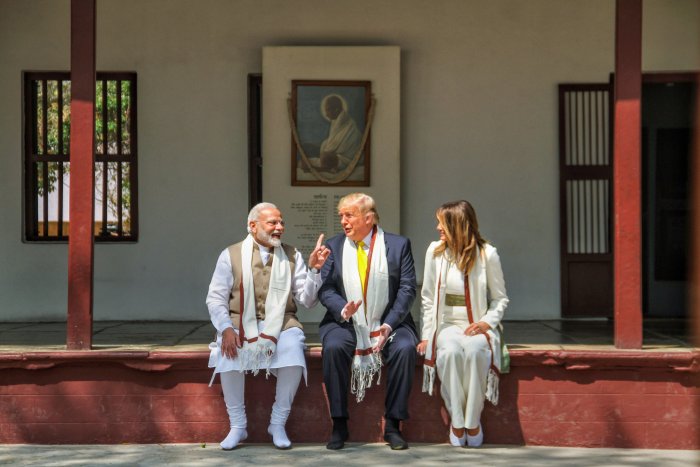Sabyasachee Dash & Bejon Kumar Misra
US President Donald J Trump’s recent India visit could not have been timed better. It was speculated that the main agenda of discussion during the visit would be strategic partnership, terrorism and means to counter the rapid rise of an assertive and aggressive China. Also, ways to undertake projects together, which would help combat One Belt One Road (OBOR) initiative of China and ways to operationalise US, India, Japan, and Australia grouping were expected to be part of discussions.
Since Bill Clinton visited India in March 2000, every US president thereafter has come to this country. What is unique about President Trump is that he is the most reviled, abused and even hated President in US history. That nothing seems to stick on him has earned him titles such as ‘Teflon Trump’. Fact is, he comes across as the victim of such abuse. What is more, he is likely to win the presidential elections again. Especially if Democratic nominee such as the would-be socialist Bernie Sanders is pitted against him.
The broader question, despite the apparent bonhomie and optics of such high-profile state visits, may be reduced to a simple question: How influential are bilateral ties for the US and India? It is clear that for the US, India is now more important than ever.
It is not only in terms of our rising economic power, but also as a geopolitical counterbalance to Chinese hegemony in the region. India, too, could benefit from closer strategic and technological partnership with the US. While our defence cooperation with Russia is of overriding importance, materiel acquired from our old and trusted ally are becoming obsolete. We desperately need upgrades for our military hardware and software.
Inking a $3-billion deal with the US for the supply of state-of-the-art combat helicopters is a step in that direction. We must also ensure that the spillover of whatever the US does in Afghanistan doesn’t turn the direction of jihadi terror back towards India. The true impact of ‘Namaste Trump’ will far exceed the hype or the fine print.
It is the overall and long-term strengthening of ties between the two countries that augurs well for the world’s future. Modi summed it up when he predicted a “far greater and closer relationship”. The Modi-Trump roadshow began and ended on the right note, despite efforts to disturb the visit by orchestrating unrest in Delhi.
Trump’s visit got off to a better start than one could have expected. The US President’s speech at the Motera stadium surpassed expectations. Even while allowing for Trump’s penchant for inflated vocabulary, such unstinted praise on Indian soil before a massive audience sends a powerful message to those in India, the US and elsewhere in the West.
However, it is the overall and long-term strengthening of ties between the world’s largest democracies that augurs well for the world’s future. That impression is the real desideratum of President Trump’s visit.
The US and India benefited from the strong economic ties that advanced prosperity, investment and job creation in both countries. The White House said the US President and Prime Minister Narendra Modi are working towards a trade pact that reflected the full potential of the bilateral economic partnership. During the US President’s visit, India announced that it would procure military equipment, including Apache and MH-60R helicopters.
Trump and Modi also are reported to have discussed the importance of building secure 5G systems to promote a trusted networking future.
Some feel Trump visited India to sell American products and services at prices advantageous to American interests and to seek support of Indian diaspora at the upcoming election in his home country. There is substance in this belief, but India, in its own interest, also needs a credible collaboration with the US administration, and this visit was squarely in that direction. Trump is popular in India; but beyond that, the fact that aspirational India responds positively to America is the big takeaway from the recent high-profile state visit.
Professor Bejon Kumar Misra is a consumer policy expert. Sabyasachee Dash is a chartered accountant.
